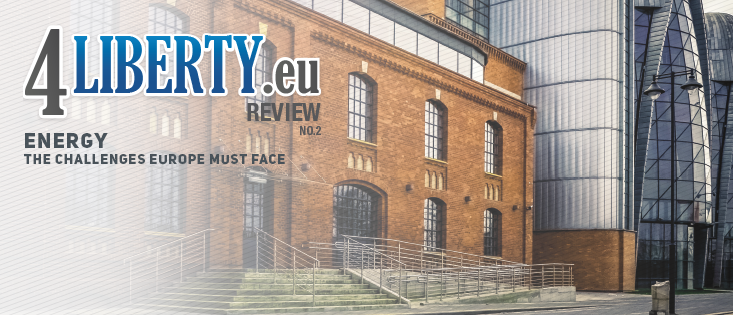
Creating efficient tools of Energy Union, which would secure the safety of the European Community, is one of the key challenges Europe must face in 2015. We need to be aware that only unanimity on this matter may protect European member states from being blackmailed by Russia and other exporters of energy resources. The task is indeed almost like cutting a Gordian knot, not only in the economic sense, but also geopolitically. European Union must be able to use its great potential that it was granted with and act as an entity. And it must be able to negotiate with other geopolitical agents as such.
If the newly appointed President of the European Council, Donald Tusk, intends to be remembered as the first leader of Europe who – despite his limited qualifications – became successful, he should employ all his diplomatic skills in order to make the dream of the European Energy Union come true during his term of office. Another point in his agenda should be devoted to establishing a mechanism of a 2nd, much wider in its scope, Eastern Partnership, which would serve as a kind of European Marshall Plan for Ukraine.
Tusk has already presented his main objectives with regard to Energy Union already as a Prime Minister of Poland, in April 2014. Let’s remind the most crucial ones: joint negotiations of gas contracts, energy infrastructure investments – especially the construction of inter-containers connecting the gas networks between the particular EU countries; better management of our indigenous European energy resources (eg. natural or shale gas); a significant strengthening of the solidarity mechanisms – should there be put an embargo on energy supply; and an intense search for alternative energy suppliers (other than Russia and Gazprom).
The events in Ukraine in a ruthless way show that – despite the high hopes of our various Western partners – Russia is determined to use its energy resources not as any other commodity in economic exchange but as a weapon for exerting pressure on the states which may be of vital importance for geopolitical interests of Moscow. Poland has pointed out to this danger repeatedly but only the case of Nord Stream gas pipeline has proved that the Western Europe should have listened to Poles more closely. Of course, there were many different reasons for such a state of affairs. Nevertheless, the current position of Germany’s former chancellor Gerhard Schröder in Gazprom proves that Russians have no problem with even corrupting the leading politicians of the West.
The recent decline in the prices of fuel may lead to a conclusion that the danger has been reduced, compared to the previous year. However, European leaders should be equipped with the ability to think strategically hence they should anticipate the fluctuations of the fuel prices in the future. As there is a strong chance that Russia will yet again try to lead Europe by the nose in the future.
Europe should also take into serious consideration employing various types of energy sources, including those currently discriminated due to the ecological aspect. Europe cannot save the world (in the ecological sense) on its own. It may, however, become eternally dependent on its enemies thus becoming an extremely non-competitive player. Therefore, Europe should not discriminate its indigenous, European energy sources – coal, conventional or not-so-conventional gas. Shale gas extraction should be thus regarded as one of the most advantageous energy sources – the method viciously opposed by pro-Russian lobbyists.
The disaster in Fukushima Daiichi Nuclear Power Plant raised endless questions on the safety of nuclear energy and brought many investments to a halt at the same time causing a gradual closing down of nuclear power stations in Germany. The questions that are still open are whether Europe did not forget about the need to keep its energy efficiency standards high and whether closing down fully operational power stations is a reasonable decision?
It is crucial for many European countries, Poland included, to retain power industry based on coal. However, replacing the obsolete, not very eco-friendly power stations with the new, ecological and highly efficient ones, obviously, is a must. If we stop our own investments in the energy sector, we will become even more dependent on import of energy and resources, what will, undoubtedly, have a detrimental effect on the entire EU economy.
While creating the Energy Union, the EU should do its best to employ such mechanisms that would limit the regulatory power over the prices of sources and energy of individual states on the national level as much as possible. Such a solution applied to this specific market would – at least to some extent – secure a proper space for market principles and energy prices reflecting incomes of the citizens of a respective state.
I really hope that the year 2015 will bring a milestone in creating long-lasting mechanisms of Energy Union. It is, indeed, in the best interest of every EU country, even though some states do not yet have an overwhelming sense of presence of energy crisis. That’s why it is absolutely vital that this new EU tool would apply to the whole European Community (if possible), and not just to some exclusive group of countries. This is also a huge opportunity for Europe. A chance to understand that only by acting together we may become a real world power. A geopolitical player that needs to be held in high esteem.
The article was originally published in the second issue of “4liberty.eu Review” entitled “Energy: The Challenges Europe Must Face”. The magazine was published by Fundacja Industrial in cooperation with Friedrich Naumann Stiftung and with the support by Visegrad Fund.
Read the full issue online.
























